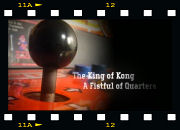 The King Of Kong is a serious documentary about two men’s battle for, and the ensuing controversy surrounding, the world’s highest Donkey Kong score.
The King Of Kong is a serious documentary about two men’s battle for, and the ensuing controversy surrounding, the world’s highest Donkey Kong score.
directed by Seth Gordon
music by Craig RicheyAppearing as themselves: Billy Mitchell, Steve Wiebe, Mark Alpiger, Walter Day
LogBook entry and review by Rob O’Hara
Review: For what sounds like to some a trivial, boring, or extremely nerdy premise for a documentary, King Of Kong is surprisingly entertaining and interesting, even for spouses and friends who wouldn’t know Mario from Luigi. (That’s a video game joke.)
In 1980, Walter Day formed Twin Galaxies, the official registrar for all videogame high scores. In 1982, a young game player named Billy Mitchell more than tripled the existing Donkey Kong record with a score of 874,300 points. Throughout the years, Mitchell has achieved other videogame-related milestones. For several years he held both the Burgertime and Centipede world records. In 1999, Billy Mitchell was the first person to play a perfect game of Pac-Man by achieving every possible point on the game’s 255 levels without dying. (That score was 3,333,360 – and for the record, on level 256 the game simply runs out of memory and crashes.) Over the years Billy Mitchell has remained friends with the guys from Twin Galaxies, even serving as an official game referee by watching submitted videotaped records of other game players’ high score attempts. Mitchell was named Video Game Player of the Century.
Enter Steve Wiebe, a nice guy who always finishes last. Wiebe lost his job the day he signed the papers on his new home, was almost a star baseball player, and plays beautiful music in his home for himself. Pretty much a failure at everything he’s attempted, Wiebe inexplicably decides one day to buy a Donkey Kong machine, put it in his garage, and play it obsessively until he breaks the world record, set by Billy Mitchell.
Surprisingly Wiebe does manage to break the record, a feat that not only shocks and surprises viewers, but the arcade community as a whole. Thus begins a huge battle that, in real life, is still being waged. At first, Wiebe’s score is discounted and his credibility is attacked. At one point, people from Twin Galaxies actually fly across the country to visit Wiebe’s Donkey Kong machine (which they do while he’s not present), implying that Wiebe’s machine has been altered. This theory is given legs when it is determined that the Donkey Kong machine in question came from Roy Shildt, Billy Mitchell’s arcade-playing nemesis. Eventually, Twin Galaxies’ head Donkey Kong expert (Billy Mitchell) invalidates Wiebe’s score and declares the old record (held by Billy Mitchell) should stand.
Twin Galaxies and friends offer Wiebe a “put-up-or-shut-up” deal of playing Donkey Kong live in front of them at a sanctioned event. Not only does Wiebe show up to the event (Mitchell is curiously absent), but in front of a crowd (of dozens) he achieves a Donkey Kong “kill screen” by playing the game so long that the machine’s code implodes and Mario dies for no apparent reason. In yet another twist of fate, shortly before being announced the best Donkey Kong player in the world, a mysterious videotape arrives with a return address from Billy Mitchell. What’s on the tape? You’ll have to watch the film to find out.
As if the film itself did not contain enough controversy, several of the documentary’s subjects have cried foul as well. Throughout the film Wiebe is presented as the honest, hard-working and often slighted underdog, while Mitchell comes off as the film’s villain – not accidentally, according to Mitchell, Twin Galaxies, and its loyal league of geeky followers. According to them, several scenes within the documentary have been creatively edited in order to skew reality. For example, near the end of the film Mitchell appears to avoid a restaurant where Wiebe is eating dinner. In reality, not only did Mitchell enter the restaurant, but he ended up buying dinner for the entire crew – including Wiebe.
The King Of Kong is an entertaining film that doesn’t let the facts get in the way of telling a good story. For being a documentary about grown men playing videogames, the movie is surprisingly engaging, one that even non-videogame-playing fans will enjoy.
